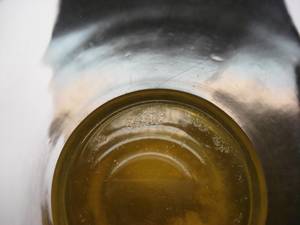Oily urine refers to the presence of oily substances in the urine and can be worrisome during pregnancy as it may indicate an underlying health issue. However, typically it poses no harm and various methods can be employed to relieve the symptoms.
What Oily Urine in Pregnancy Looks Like
A range of uncommon symptoms can occur during pregnancy due to changes in hormone levels and metabolism. One of these symptoms is oily urine, which can be alarming for some expectant mothers. Oily urine refers to urine that appears to have a thin layer of oil or fat floating on top.
The appearance of oily urine during pregnancy may be due to a condition called chyluria. Chyluria is a medical condition that occurs when lymphatic fluid leaks into the urinary system. This lymphatic fluid can contain fat, which gives the urine a greasy appearance. Chyluria is more common in countries where parasitic infections are prevalent, but it can also occur in other regions.
Aside from chyluria, there are other factors that can cause oily urine during pregnancy. For instance, consuming a high-fat diet or taking certain supplements can lead to oily urine. In some cases, medications may also cause oily urine as a side effect.
Spotting oily urine during pregnancy is generally not a cause for concern, especially if it is due to dietary or medication-related factors. However, if the appearance of oily urine is accompanied by other symptoms such as pain or discomfort during urination, frequent urination, or fever, it’s best to consult a healthcare provider.
Causes of Oily Urine During Pregnancy
Expectant mothers may feel worried if they notice oily urine during pregnancy. Although it can often be harmless, it could also signal an underlying health problem. It is important to understand the potential reasons behind oily urine during pregnancy:
1. Dehydration
- When a pregnant woman’s fluid intake is insufficient, her urine can become highly concentrated, sometimes appearing cloudy or oily.
- Dehydration can cause urine to contain higher levels of waste products, leading to a change in its consistency.
2. Prenatal Vitamins
- Prenatal vitamins and supplements contain high concentrations of water-soluble vitamins, like vitamin B and vitamin C, which can cause oily-appearing urine when excreted.
3. Diet
- Consuming a diet rich in oils and fats may lead to excretion of excess fatty acids, giving the urine an oily sheen.
- Additionally, foods with natural or artificial colorings can alter the appearance of urine.
4. Ketosis
- During pregnancy, the body may resort to fat stores for energy, especially if the intake of carbohydrates is low, leading to ketosis.
- Ketones, byproducts of fat metabolism, can create an oily film on the surface of the urine.
5. Proteinuria
- Proteinuria, the excess of protein in the urine, is common in pregnant women, especially in the later stages, and can give urine a foamy or oily appearance.
- Proteinuria can be a sign of pre-eclampsia, a pregnancy complication characterized by high blood pressure.
6. Hormonal Changes
- Fluctuations in hormones during pregnancy can cause alterations in urine. The kidneys’ filtration system can be impacted by certain hormones, resulting in a glossy appearance.
7. Urinary Tract Infections (UTI)
- Bacteria originating from a urinary tract infection can lead to the presence of pus in the urine, resulting in a cloudy or oily appearance.
- Urinary tract infections are more common during pregnancy as a result of alterations in the urinary system.
8. Cholestasis of Pregnancy
- Cholestasis is a liver condition that hinders the movement of bile, causing it to be present in the urine and potentially appearing oily.
- This condition can commonly manifest during the latter stages of pregnancy and has the potential to endanger the well-being of both the mother and the unborn child.
Treatment for Oily Urine in Pregnancy
If you are experiencing oily urine during pregnancy, there are several things you can do to help alleviate the symptoms:
- Increase your water intake: Drinking plenty of water can help flush out any excess oils or other substances from your urinary system.
- Avoid fatty foods: Eating a diet that is low in fat can help reduce the amount of oil that is excreted in your urine.
- Increase your fiber intake: Eating a diet that is high in fiber can help regulate your digestive system, which can reduce the amount of oil that is excreted in your urine.
- Avoid certain medications: If you are taking any medications that may be contributing to oily urine, talk to your doctor about alternative options.
- Consult with your doctor: If you are experiencing other symptoms, such as abdominal pain or nausea, it’s important to consult with your doctor to rule out any underlying health problems.
Conclusion
Although it may be worrisome to have oily urine while pregnant, it is typically not a cause for alarm and can be addressed through making minor adjustments to one’s lifestyle. If an individual is encountering oily urine or any other symptoms, it is essential to consult with a doctor in order to ensure the well-being and protection of both the mother and the baby.









